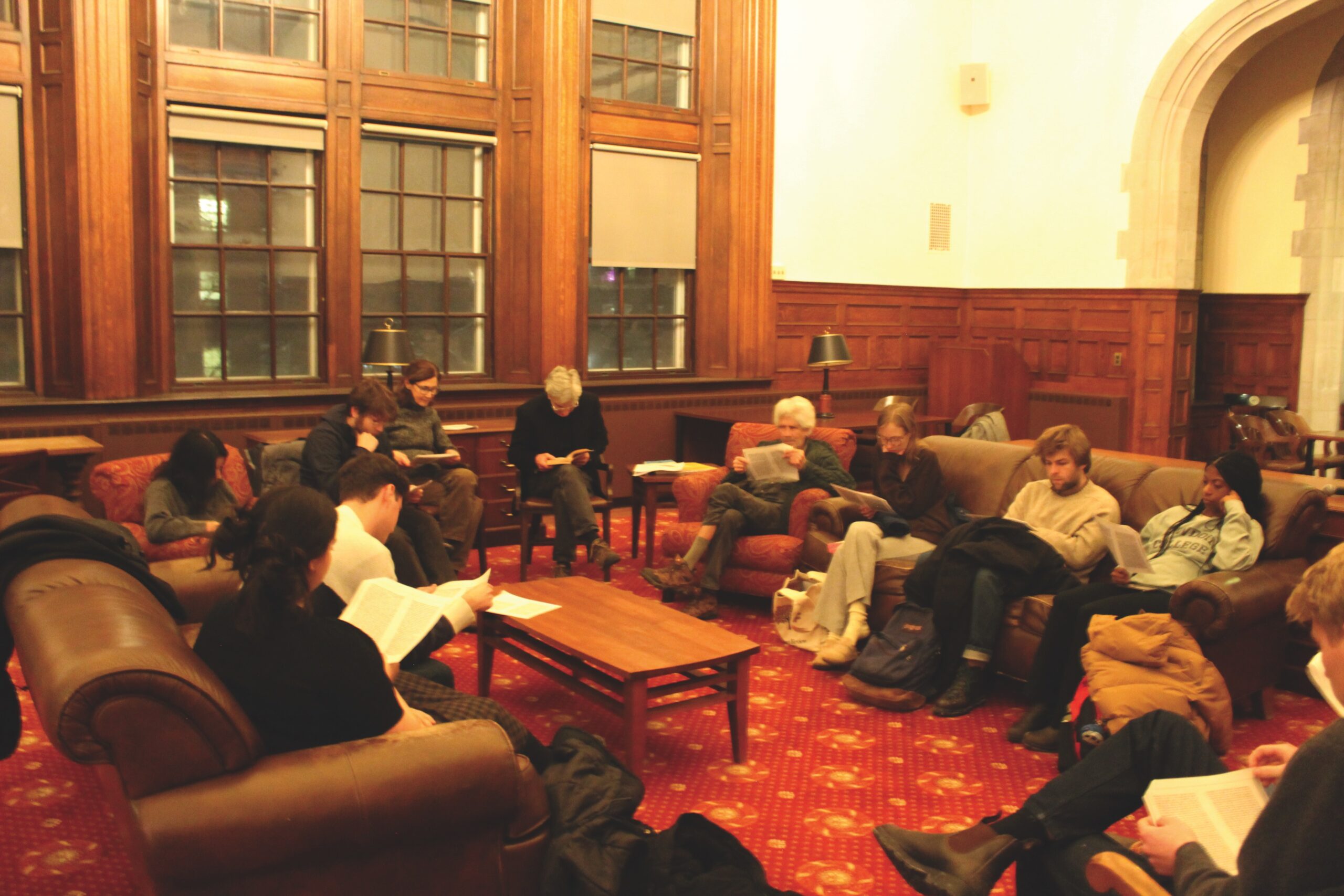David Spurr celebrates 143 years of James Joyce
February 7, 2025
 Carolina Weatherall
Carolina Weatherall
University of Geneva Professor Emeritus David Spurr introduced and led a reading of James Joyce’s “Finnegans Wake” in Hubbard Hall on Sunday, February 2 in celebration of Joyce’s 143rd birthday.
In the Shannon Room, a mix of students and community members gathered alongside Spurr to celebrate Joyce through the practice of reading aloud, with each person in attendance taking their turn to read a few lines of the notoriously difficult-to-understand novel.
In between paragraphs, Spurr offered his own thoughts on lines to guide attendees through the unique narrative style.
“You know that experience of having a dream? And then you try to tell someone what the dream was, and you can’t really capture in your customary way of speaking, in your grammar, in your syntax, in your English, what exactly the dream was, because the dream had a different logic from the one we use in speaking? And the dream had things going on that can’t really be captured in the language that we use? Joyce has tried to reproduce that effect in the language that he writes [in ‘Finnegans Wake’],” Spurr said.
The novel scares away many readers due to its nonlinear narrative style and inclusion of portmanteau words and puns that often contain multiple meanings in over 60 languages. Still, Spurr finds utility in reading the novel and encourages others to do so, despite how daunting it might seem.
“Even more so than ‘Ulysses,’ ‘Finnegans Wake’ is a book that you have to kind of live with for a number of years to begin to get a handle on. But that’s okay. There’s no law that says you have to understand everything about a literary work,” Spurr said.
Professor of English Marilyn Reizbaum, a Joyce scholar who has taught his works in Bowdoin English classes since 2020, had the idea to bring Spurr to campus. Because Reizbaum is on sabbatical for the spring 2025 semester, she was not able to lead the discussion herself, which she usually conducts.
“Luckily, a colleague who is renowned for his work on Joyce and modernism more generally, Professor David Anton Spurr, has moved to the Brunswick area after retiring from the University of Geneva in Switzerland,” Reizbaum wrote in an email to the Orient. “I was very glad he was willing to hold such a reading because he could add a dimension we did not have a chance to cover in the class: Joyce’s final novel, ‘Finnegans Wake.’”
To Reizbaum, the act of communal reading aloud, specifically outside of explicitly professional settings, encourages more connection with Joyce’s work.
“Such reading not only celebrates a great writer, but one who has touched readers in many spheres, despite the rap Joyce has received as being difficult,” Reizbaum wrote. “When we hold these events, people emerge from all walks of the surrounding community to join students and professors in reading aloud Joyce’s work.”
One student in attendance, Ben Israel ’25, mentioned how reading Joyce aloud could affect one’s experience with the text.
“I think Joyce’s [novels] often can benefit from being spoken aloud, as they really are very free and associative, and when you hear something aloud, it changes the way that you interpret it,” Israel said.
He also mentioned the benefit of a collective reading experience.
“I was really grateful for the opportunity to get to spend some time with fellow Joyceans and learn some new things about ‘Finnegans Wake,’ which is a text that I hadn’t yet approached,” Israel said.
Reizbaum noted that, although Joyce has been purported to be a difficult author to read, the challenges in his writing elevate rather than detract from his text.
“[Joyce] has influenced writers and thinking around the world—one can find his traces everywhere,” Reizbaum wrote. “I often quote Judith Butler when talking about difficulty in terms of writers like Joyce. She talks about difficulty as ethical—as insistence on a lack of complacency about understanding the world.”
More than being difficult, Joyce desired to get the most out of literature by using the written word in fundamentally new ways, something that continues to influence scholars like Reizbaum and Spurr, as well as Joyce’s readers, so many decades later.
“Joyce is one of the great writers precisely because he challenges us to think about what writing does and how we read, what we expect when we read and what we take for granted about greatness,” Reizbaum wrote. “[Joyce] profoundly challenged the writing conventions of the early 20th century and we are still learning those lessons.”

Comments
Before submitting a comment, please review our comment policy. Some key points from the policy: